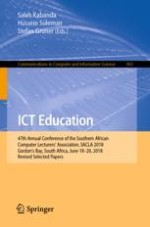2019 | OriginalPaper | Chapter
Enhancing Object-Oriented Programming Pedagogy with an Adaptive Intelligent Tutoring System
Authors : Methembe Dlamini, Wai Sze Leung
Published in: ICT Education
Publisher: Springer International Publishing
Activate our intelligent search to find suitable subject content or patents.
Select sections of text to find matching patents with Artificial Intelligence. powered by
Select sections of text to find additional relevant content using AI-assisted search. powered by
